This lasted until August of 1939, when the Soviet Union and Germany signed a pact, which included a secret protocol dividing Eastern Europe into "spheres of influence", which assigned Latvia to the Soviet Union. On October 5, 1939 the two countries signed a mutual assistance pact, but later in June of 1940, the Soviet Union issued an ultimatum to Latvia, accusing it of not living up to the agreements of the treaty, namely forming a military alliance against the USSR with the two other Baltic nations, Lithuania and Estonia.
The three Baltic nations had formed an agreement to support each other in international affairs back in 1934 and tried to remain neutral, but the massive armies of Germany to the west and the Soviets bordering them to the east made that an impossibility. The Soviets requested a new government be formed and to guarantee the Soviet military free entrance into Latvia. The government gave in to the ultimatum and on June 17, 1940, Soviet forced entered Latvia. By July 21st, a new Soviet controlled parliament was elected and declared its consent for Latvia to become a part of the Soviet Union.
Fast forward to 1990, and Latvia, emboldened by recent developments in the Soviet Union under the leadership of Mikhail Gorbachev and his policies of giving the republics of the Soviet Union more control over their own affairs, Latvia issued a declaration for the Restoration of Independence on May 4th following massive public demonstrations.
The Soviet government declared the declaration void because it violated the Constitution of the Soviet Union as well as the Constitution of Latvia (which had been put in place by the pro-Soviet government). Latvia's response was to point out that it was annexed by the Soviet Union without holding a public referendum and it was not seceding from the Soviet Union, but restoring it's independence. Negotiations failed to resolve the issue and on January 7, 1991, Soviet military troops moved into the capital of Riga. 700,000 Latvians gathered on January 13th and began to erect barricades to protect likely targets for the Soviets in response to the increasing Soviet military presence in the city and an attack on a TV tower which killed 13 in neighboring Lithuania by the Soviets intending to prevent Lithuania's similar attempts to withdraw from the Soviet Union.
The barricades were manned by the citizens of Latvia, including Latvian goaltender Arturs Irbe, who left the Soviet Union National Team to join his fellow countrymen who took to the streets in protest, erecting barricades in front of government buildings and media outlets. Red Army hockey officials warned Irbe that if he did not return to the team, he would never play for it again.
The first attacks happened the following day with the first casualty, Roberts Mûrnieks, occurring on the 16th. His funeral on the 19th resulted in a demonstration which led to more arrests and beatings.
The Latvian government then took control of the barricades on the 24th and most of the citizen defenders were gone by the next day.
On August 21, 1991, hard-line party members attempted to take control of the Soviet Union from Gorbachev and his government, which ultimately failed. The following day Latvia, and Estonia, both declared their full independence, which was recognized by the Soviet Union on September 6th.
The day is celebrated annually in Latvia with special exhibitions, church services and an official state flag raising ceremony at Riga Castle. Award ceremonies, concerts, dances and other events, such as a solemn flower-laying ceremony at the Freedom Monument, parades and fireworks all take place.
The glory days of Latvian hockey was the early 2000's when they were battling Switzerland for the "best of the rest" when they boasted NHL players such as Sandis Ozolinsh, Irbe and Sergei Zholtok on a regular basis. Their national team suffered a blow when veteran Karlis Skrastins was killed in the Lokomotiv Yaroslavl air disaster in 2011.
For this past season, two Latvians played in the NHL, Zemgus Girgensons of the Buffalo Sabres and Ronalds Kenins of the Vancouver Canucks.
In addition to their national team, their main club team Dinamo Riga boasts a roster of 75% Latvians and competes in the KHL. Those players also make up the bulk of the current national team in addition to those Latvians playing in other various European and North American leagues.
Regardless of whether the team wins or loses, the Latvian fans are recognized at the loudest and most passionate in the world, regularly traveling en masse to tournaments both near and far.
Their jerseys would only undergo minor detail changes while remaining in use through 2004, such as collar style and sleeve number placement, and see Latvia through some of their finest moments, such as their emotionally charged 3-2 defeat of Russia at the 2000 World Championships in Russia, and defeating the Russians again 2-1 in 2003.

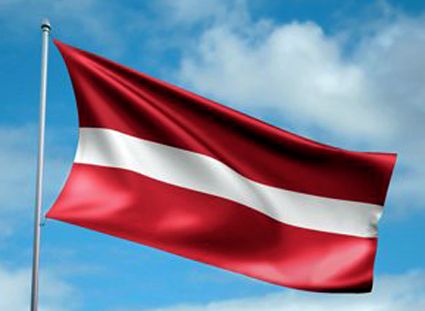
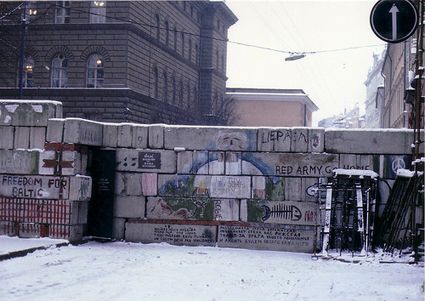
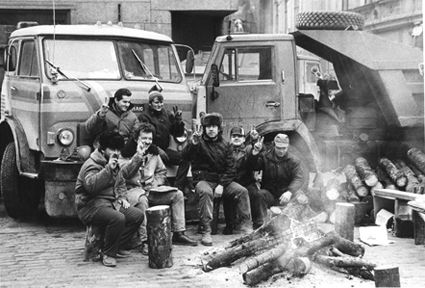
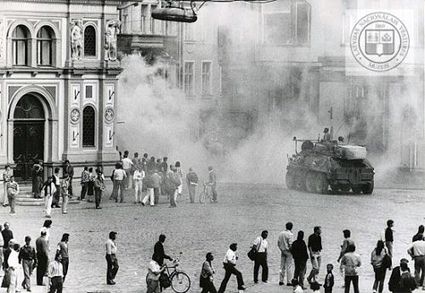
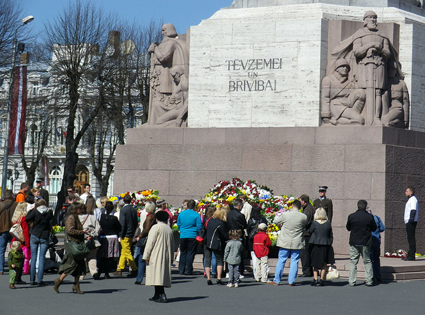

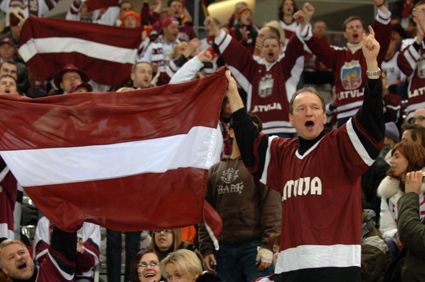
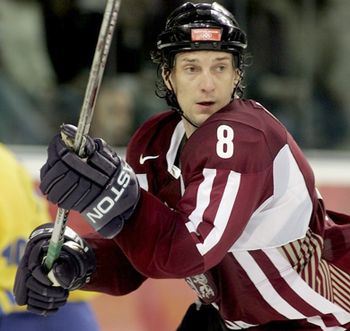
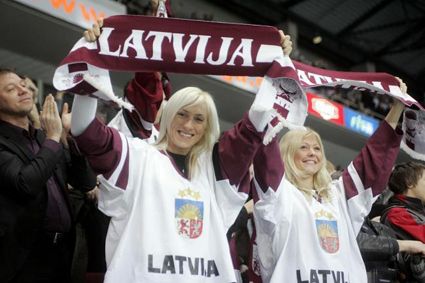
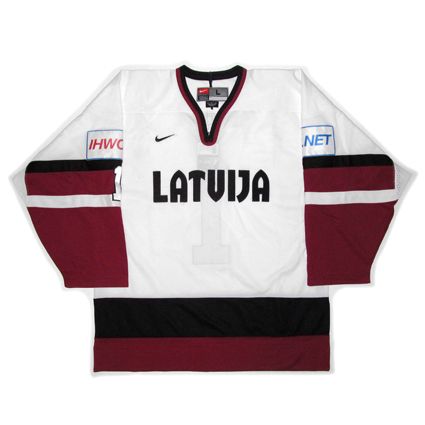
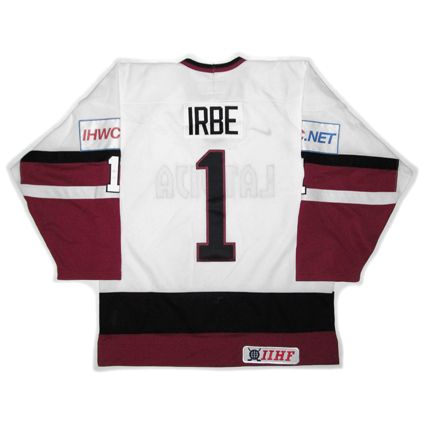
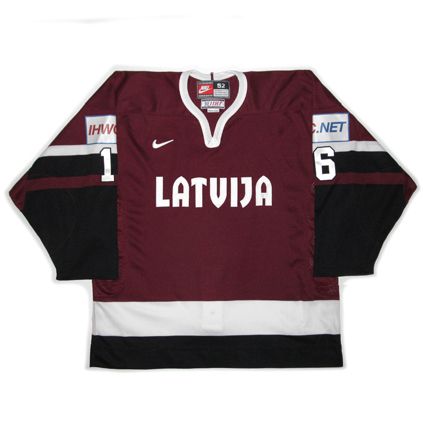
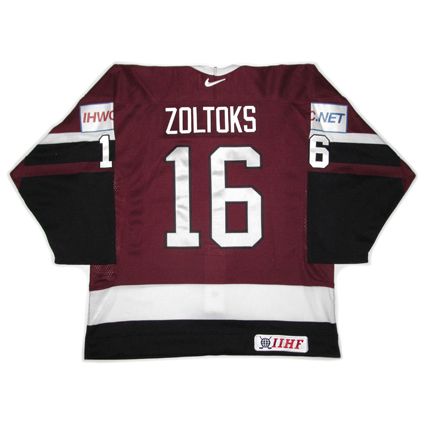










No comments:
Post a Comment
We welcome and encourage genuine comments and corrections from our readers. Please no spam. It will not be approved and never seen.